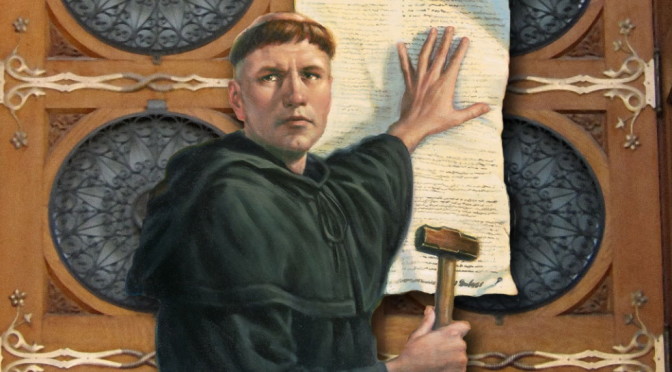September 29, 2016
Martin Luther and The 95 Theses

In 1517 Martin Luther was provoked by Johann Tetzel to write his famous 95 Theses. In the spring of 1517, Johann Tetzel, a German friar who practiced the selling of indulgences in Germany, was preaching on indulgences in the city of Jüterbog. By selling indulgences, Tetzel and the Catholic Church gained monetary value in exchange for a believer’s future diminished time in purgatory. In other words, one’s sins would be forgiven if one were to buy these indulgences. Luther, who was a Theology professor at the University of Wittenberg, attended to Tetzel’s preaching. Luther felt disgusted by the act, and as a Theology professor he felt that he had to address this issue in a scholarly way. During the summer of 1517 Luther started to write the 95 Theses, which was not only a criticism of the selling of indulgences, but also a criticism of many of the actions and practices of the Catholic Church, particularly of its hierarchy. 1

The 95 Theses consisted of Luther challenging the teachings of the Catholic Church on the nature of penance, the authority of the pope, and the selling of indulgences. He believed that the salvation of a person’s soul should not be based on one’s monetary contribution to the church. Luther believed that faith was the only way to reach salvation and not the monetary contributions to the church. Quoting Saint Paul, Luther wrote, “The just will live by faith.”2 In the 95 Theses Luther not only criticized the Catholic Church and its corruption, but also set numerous propositions for reforming the Catholic Church. After writing the 95 Theses, on October 31, 1517, Luther decided to nail them to the door of the Wittenberg Church. After this event, the 95 Theses started to be spread throughout Europe. A year after Luther wrote the 95 Theses, they were condemned as heretical by Pope Leo X, and Luther was also excommunicated from the Catholic Church that same year.3
Martin Luther was given the chance to recant his statements against the Catholic Church at the Imperial Diet of Worms in 1521, but he refused. Luther famously said:
Unless I am convinced by the testimony of the Holy Scriptures or by evident reason—for I can believe neither pope nor councils alone, as it is clear that they have erred repeatedly and contradicted themselves—I consider myself convicted by the testimony of Holy Scripture, which is my basis; my conscience is captive to the Word of God. Thus I cannot and will not recant, because acting against one’s conscience is neither safe nor sound. God help me. Amen.4
Luther believed that salvation was reached by faith alone, and not by the works of giving money to the church, and he held to these beliefs for the rest of his life. Luther was also responsible for starting the Protestant Reformation, where a large number of Catholics decided to follow his steps by separating from the Catholic Church. Luther not only started the Protestant Reformation, but he also contributed to the so-called Catholic Reformation of the Catholic Church as well, since his 95 Theses sparked a reform movement within the Catholic Church that culminated in the Council of Trent. Even though Luther was seen as a controversial person in the Catholic Church, he contributed in significant ways to what the Catholic Church is today.5
- Encyclopedia Britannica, s.v. “Johann Tetzel.” ↵
- Romans 1:17. ↵
- Andrew Culp and Kevin Kuswa, “Signs of protest rhetoric: From Logos to logistics in Luther’s Ninety-Five Theses,” Quarterly Journal Of Speech 102, no. 2 (May 2016): 153-154. ↵
- Heiko Oberman, Luther: Man Between God and the Devil (New York: Image Books – Doubleday Press, 1992), 39. ↵
- Scott H. Hendrix, Martin Luther: Visionary Reformer (New Haven: Yale University Press, 2015), 145-150. ↵
Tags from the story
Martin Luther
Ninety-Five Theses